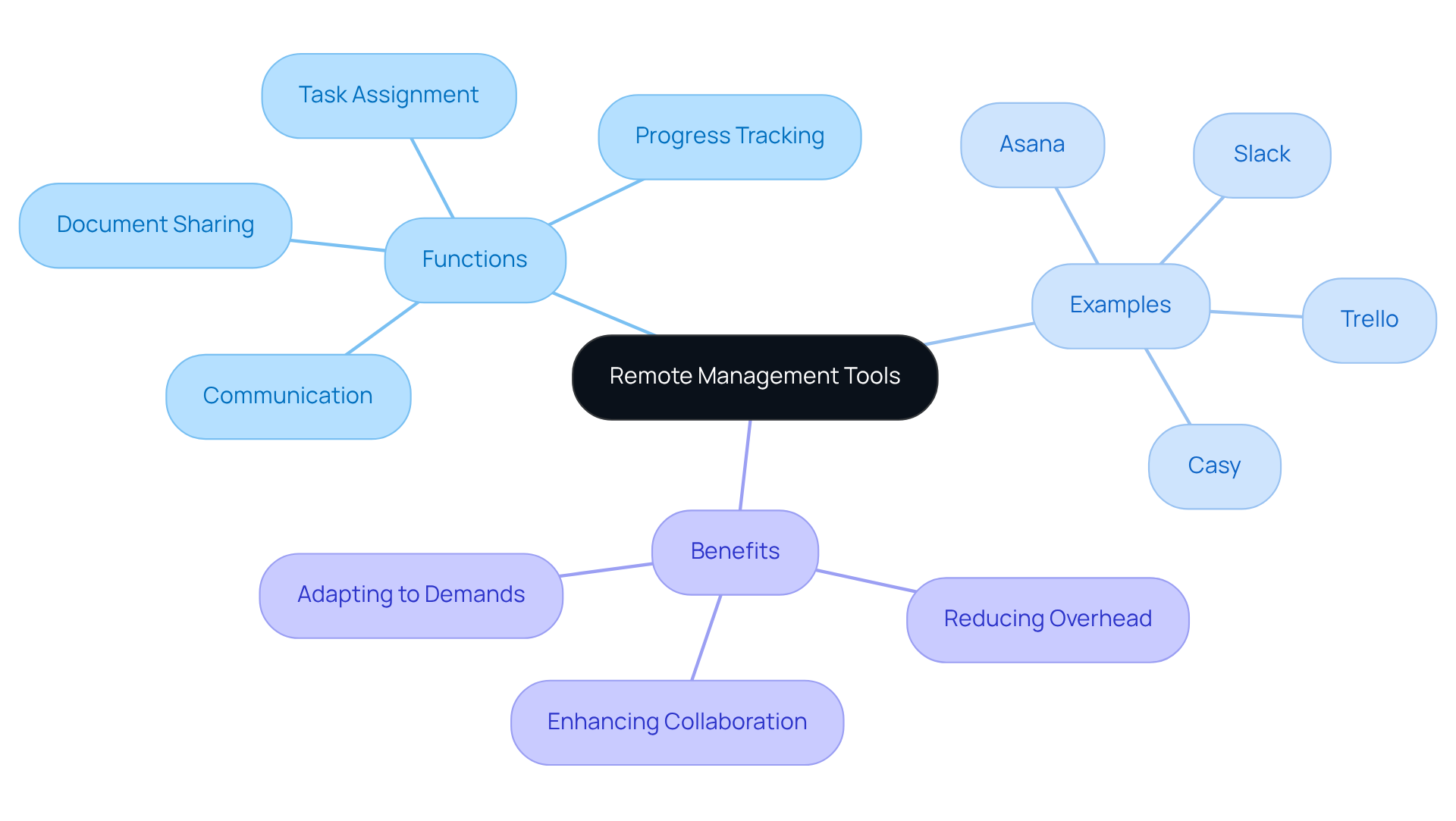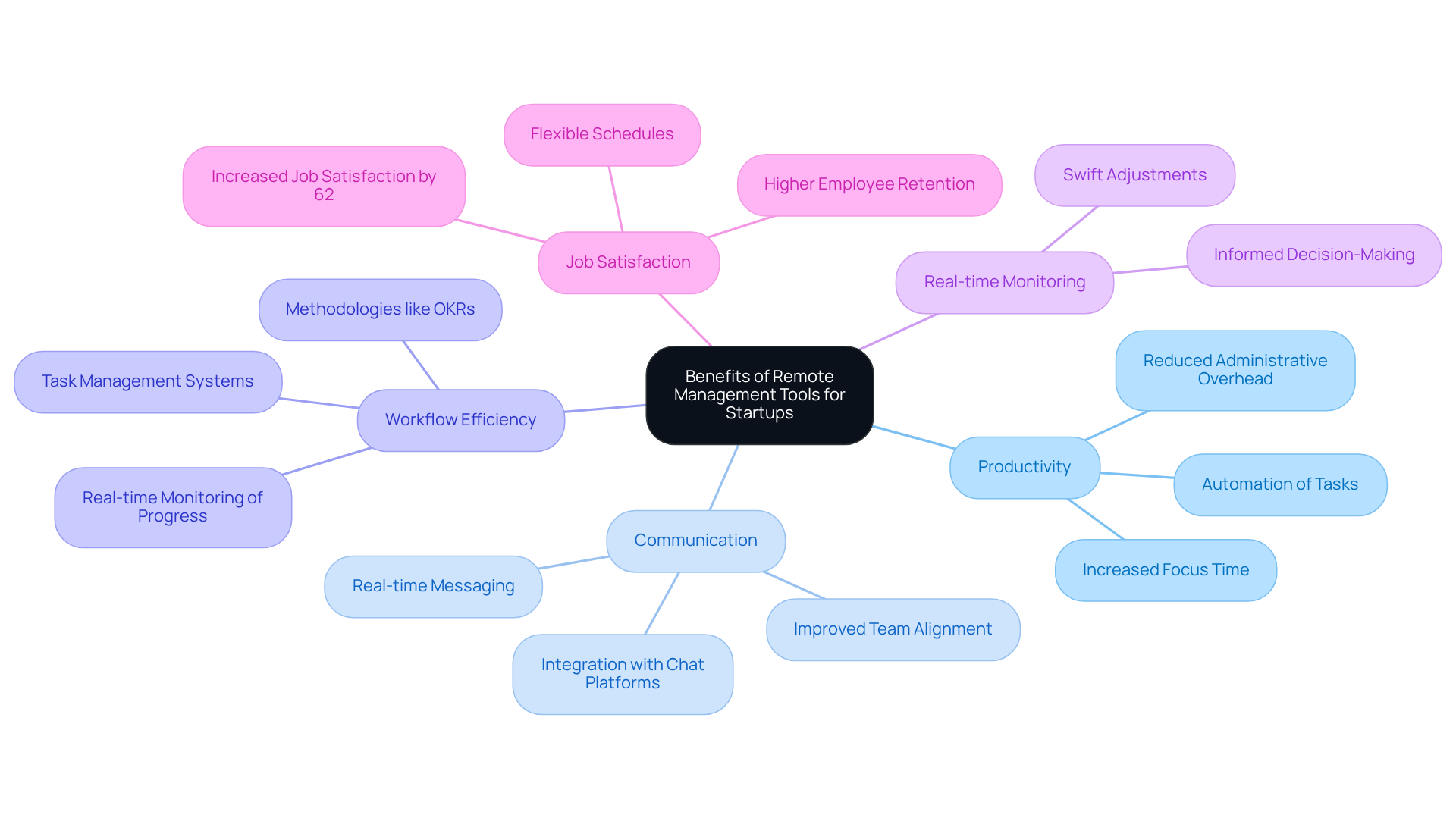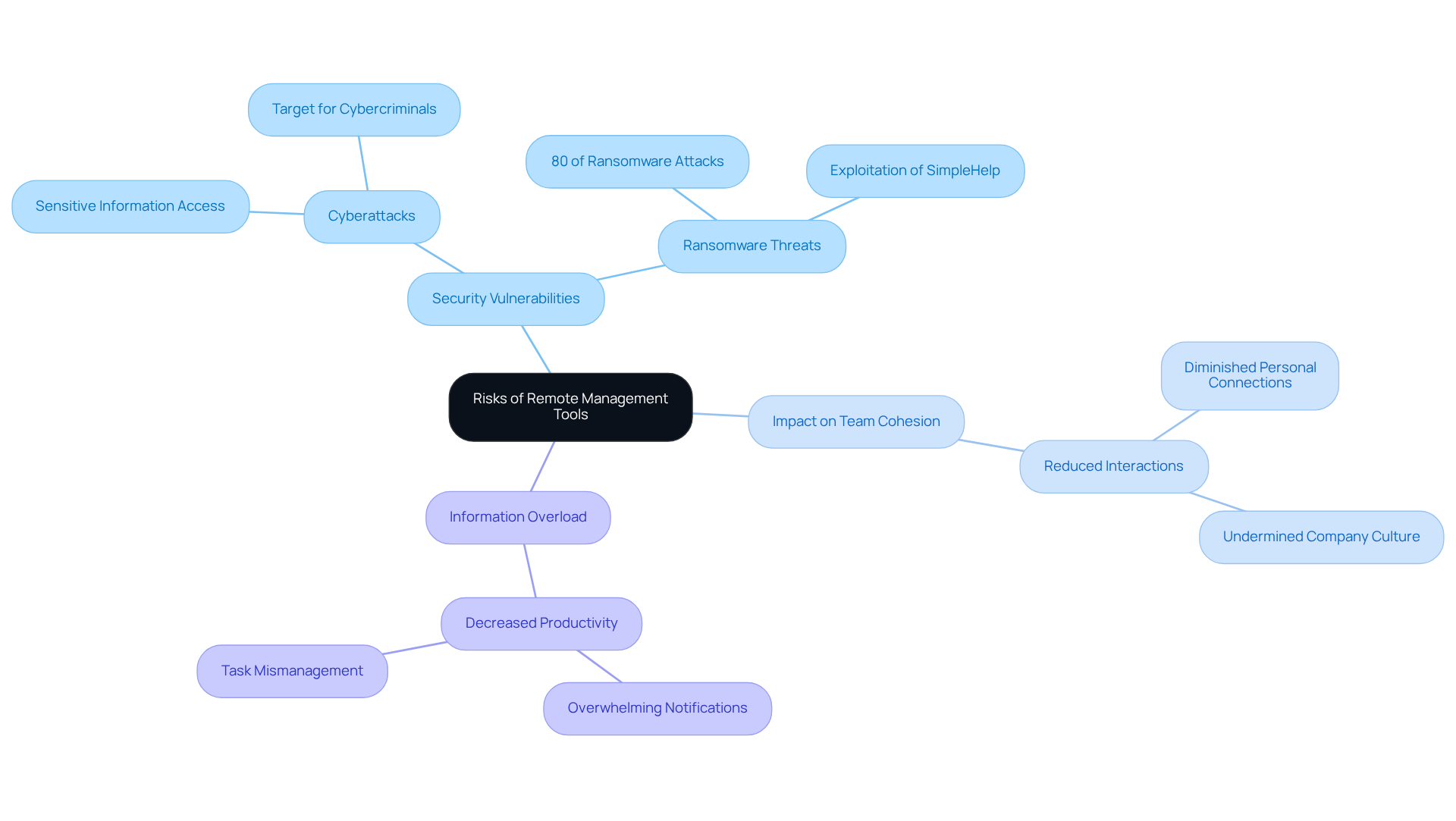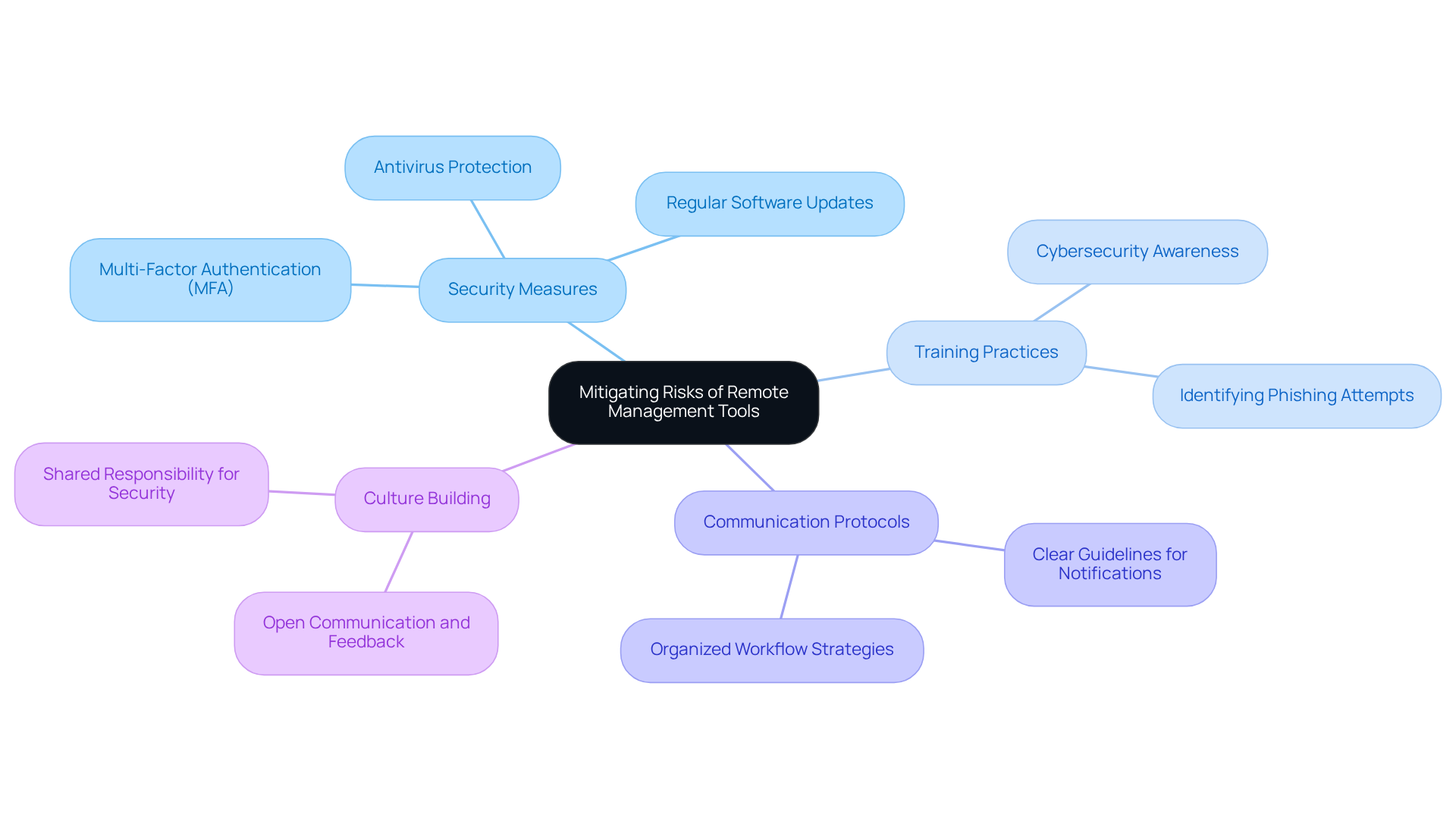Overview
Remote management tools are indispensable for the success of startups. They significantly enhance productivity, streamline communication, and automate administrative tasks. This allows teams to concentrate on what truly matters: innovation.
How can these tools impact your startup's efficiency? By facilitating real-time project monitoring and task management, they foster a cohesive work environment that drives efficiency and supports agile operations in a remote setting.
Embracing these tools is not just a choice; it’s a strategic move towards a more productive and innovative future.
Introduction
Remote management tools have emerged as indispensable assets for startups navigating the complexities of a distributed workforce. By streamlining communication, automating tasks, and enhancing collaboration, these tools empower teams to maintain productivity and agility—crucial elements for success in a competitive landscape. Yet, as startups increasingly rely on these technologies, they face a pressing question: how can they harness the benefits of remote management tools while effectively mitigating the associated risks? This article delves into the transformative potential of these tools, the advantages they offer, and the strategies startups can implement to safeguard their operations in an ever-evolving digital environment.
Define Remote Management Tools and Their Functions
Remote management tools represent a vital suite of software tailored to facilitate the management of teams and projects from a distance. These tools typically include essential features such as task assignment, progress tracking, communication channels, and document sharing. Prominent examples include project management systems like Asana and Trello, communication platforms such as Slack, and comprehensive solutions like Casy, which seamlessly integrates with chat applications to automate task creation and updates.
By automating routine tasks, these resources significantly reduce administrative overhead, allowing teams to focus on their core activities. This capability is especially beneficial for startups, where agility and efficiency are paramount. These applications empower teams to swiftly adapt to changing project demands, thereby sustaining productivity in a remote environment.
Have you considered how these tools can transform your operational efficiency? Embracing remote management tools not only streamlines workflows but also enhances collaboration within your team. As you navigate the challenges of remote work, leveraging such technologies can be the key to maintaining momentum and achieving your objectives.

Examine the Benefits of Remote Management Tools for Startups
Remote management tools offer startups a multitude of advantages, significantly enhancing productivity, communication, and workflow efficiency. By automating task management, remote management tools drastically reduce the time spent on administrative duties, allowing teams to concentrate on innovation and execution. For instance, startups utilizing resources like Casy, which integrates seamlessly with popular chat platforms such as Slack and Telegram, can effortlessly transform chat conversations into actionable tasks. This reduces the need for manual updates and coordination efforts. Such automation not only streamlines processes but also fosters improved communication among team members, irrespective of their physical locations—an essential factor for maintaining alignment and collaboration with remote management tools in a remote setting.
Moreover, remote management tools facilitate real-time monitoring of project progress, enabling swift adjustments and informed decision-making. Startups can implement methodologies like OKRs within these platforms to prioritize tasks effectively, ensuring that all team members remain aligned with the startup's strategic objectives. Notably, studies indicate that remote employees can be up to 47% more efficient than their in-office counterparts, underscoring the effectiveness of these solutions in enhancing overall performance. Additionally, flexible schedules supported by these tools can elevate job satisfaction by 62%, contributing to improved employee retention. By embracing remote management tools, startups can cultivate a cohesive and efficient work environment that not only drives success and nurtures innovation but also realizes substantial cost savings associated with remote work.

Analyze the Risks of Using Remote Management Tools
Remote administration resources offer considerable advantages; however, they also present significant hazards that startups must manage. Security vulnerabilities pose a major concern, as these resources often require access to sensitive company information and communications. If not adequately secured, they can become prime targets for cyberattacks. The Cybersecurity and Infrastructure Security Agency (CISA) has warned that well-known security applications, including access software, are increasingly exploited by attackers to exfiltrate data, with midmarket companies witnessing a notable rise in direct ransomware claims. Alarmingly, distant access applications were the entry point for 80% of ransomware attacks in 2024, underscoring the critical need for startups to remain vigilant in their security practices.
Moreover, an overreliance on these resources can diminish personal interactions among team members, potentially undermining cohesion and company culture. The risk of information overload is another pressing factor; the sheer volume of notifications and updates can overwhelm employees, leading to reduced productivity. Startups must meticulously assess these risks when selecting and implementing remote management tools. It is essential to ensure that robust security measures—such as multifactor authentication and regular audits of remote management tools—are established to protect sensitive information while fostering a collaborative team environment. By striking a balance between the advantages of these resources and the necessary security protocols, startups can mitigate risks and enhance their operational effectiveness.

Implement Strategies to Mitigate Risks of Remote Management Tools
To effectively mitigate the risks associated with offsite administration resources, startups must implement several best practices. Robust security measures, such as multi-factor authentication (MFA), significantly enhance protection against unauthorized access. In fact, statistics reveal that MFA can prevent up to 99.9% of account compromise attacks, making it a critical component of any security strategy. Moreover, it is crucial to recognize that 74% of breaches involve a human element, underscoring the necessity of comprehensive employee training in security practices.
Regular software updates are equally vital, as they address vulnerabilities that cybercriminals often exploit. External sources emphasize that consistent software updates and antivirus protection are essential for defending against threats.
Establishing clear communication protocols is imperative to prevent information overload, ensuring that team members are not overwhelmed by notifications. This can be achieved by setting guidelines on when and how to utilize management resources, fostering a more organized workflow.
Consistent training sessions focused on equipment usage and cybersecurity awareness are essential for enhancing group preparedness. These sessions should encompass the identification of phishing attempts and the importance of secure Wi-Fi connections, particularly as employees frequently work from home networks that may lack enterprise-grade protections. Ongoing cybersecurity education empowers employees to effectively identify and avoid cyber threats, reinforcing the importance of this training.
Fostering a culture of open communication and feedback is also critical. This approach aids in preserving group unity and prevents feelings of isolation or disengagement among remote employees. By proactively addressing these risks, startups can utilize remote management tools effectively while safeguarding their operations and enhancing overall productivity. In summary, adopting these best practices will not only bolster security but also improve team dynamics in a remote work environment.

Conclusion
Embracing remote management tools is essential for startups aiming to thrive in today’s competitive landscape. These tools not only streamline operations but also foster collaboration and efficiency, enabling teams to navigate the complexities of remote work effectively. By leveraging these technologies, startups can enhance productivity and maintain momentum, ensuring they remain agile and responsive to changing market demands.
The article highlights several key advantages of remote management tools:
- Automation of routine tasks
- Improved communication
- Real-time project monitoring
These features empower startups to focus on innovation while minimizing administrative burdens. However, it also addresses the potential risks—such as security vulnerabilities and the challenge of maintaining team cohesion—emphasizing the need for a balanced approach.
Ultimately, the successful integration of remote management tools hinges on implementing robust security measures and fostering a culture of open communication. Startups are encouraged to adopt best practices that not only mitigate risks but also enhance team dynamics. By doing so, they can fully harness the benefits of remote management tools, paving the way for sustained growth and success in an increasingly digital world.
Frequently Asked Questions
What are remote management tools?
Remote management tools are software designed to help manage teams and projects from a distance. They include features such as task assignment, progress tracking, communication channels, and document sharing.
What are some examples of remote management tools?
Examples of remote management tools include project management systems like Asana and Trello, communication platforms such as Slack, and comprehensive solutions like Casy, which integrates with chat applications to automate task creation and updates.
How do remote management tools benefit teams?
These tools automate routine tasks, reduce administrative overhead, and allow teams to focus on their core activities. This is particularly beneficial for startups that require agility and efficiency.
How do remote management tools enhance collaboration?
By streamlining workflows and providing communication channels, remote management tools enhance collaboration within teams, enabling them to adapt quickly to changing project demands.
Why are remote management tools important for maintaining productivity?
They help sustain productivity in a remote environment by automating tasks and facilitating better communication, which is crucial for navigating the challenges of remote work.



